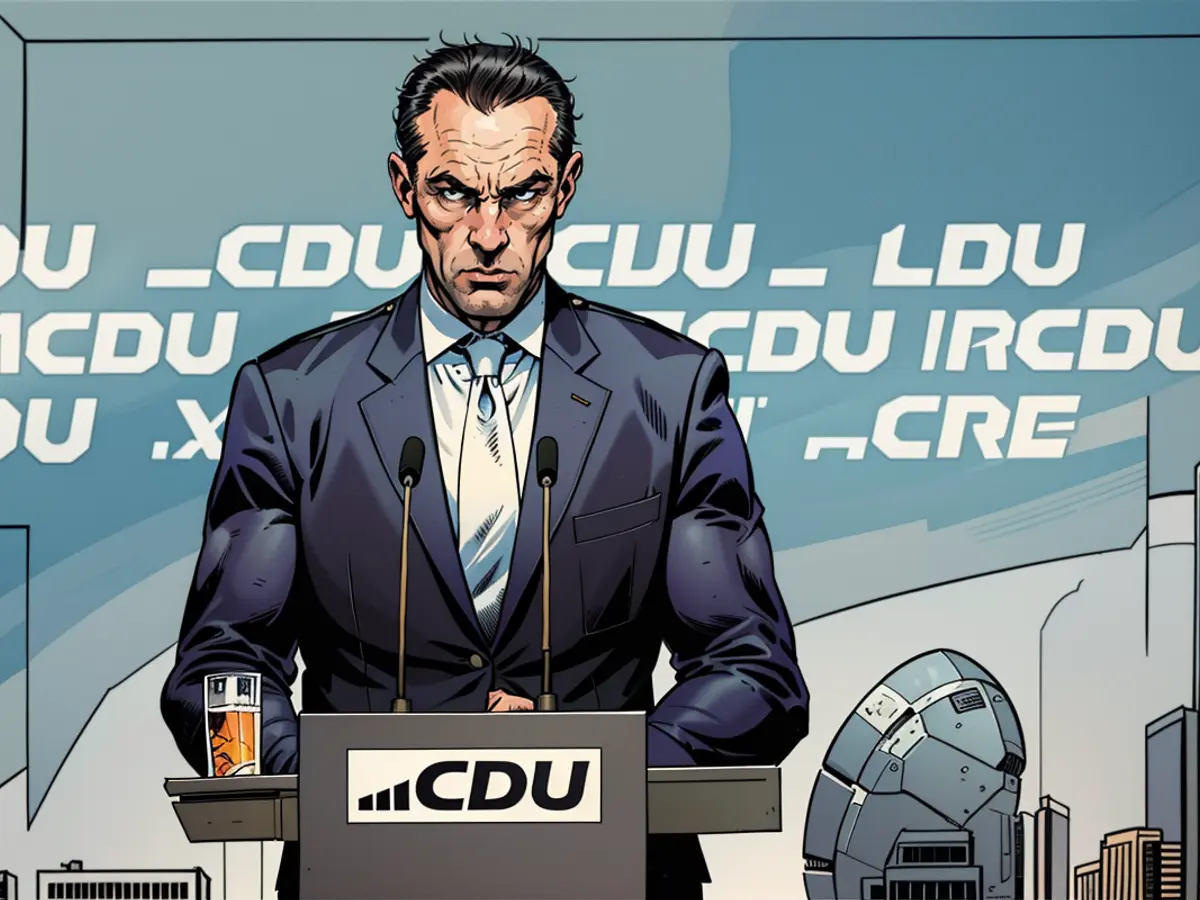In Thuringia's local elections, the CDU party gains control over the town hall in Weimar.
Thuringia has made its decision. The overall voter turnout isn't as strong as five years ago. The CDU is currently leading in major cities while AfD has often lagged behind, with the Left party looking down the barrel. Meanwhile, a right-wing extremist can celebrate their victory.
This electoral process in Thuringia began three months before the state parliamentary election during a significant year for state-level elections. With approximately 1.7 million citizens involved in choosing municipal parliaments and municipal officials, it serves as a crucial indicator, especially regarding the performance of AfD, which is deemed right-wing extremist by the state constitution protection, and its leader Björn Höcke. The Bündnis Sahra Wagenknecht (BSW) is making its debut in Thuringian elections, hoping to secure a seat in the Erfurt state parliament. The outcome of this election is drawing significant interest, and the election server of the Statistical State Office is already overwhelmed at 8 p.m.
At 6 p.m., the polling stations closed, but voting continued for a little longer in some places such as Mühlhausen. Amazingly, any voters still in line at 6 p.m. were permitted to cast their votes. Earlier, "Thüringer Allgemeine" reported on long waiting times and missing ballot papers in Jena. The local district election officer, Matthias Bettenhauser, mentioned, "In Winzerla, the demand was so great that we had to deliver ballot papers." It happened in other densely populated areas too.
The initial turnout leveled at 46.2%, which is slightly lower than it was in the 2019 communal and European elections. It was initially thought that the voter turnout would be higher than five years ago. Around 30,000 election workers will be counting the votes over the upcoming hours, according to the "Thüringer Allgemeine".
CDU Secures Town Hall in Suhl
The election results in Suhl were quick to appear. By 6:30 p.m., it became clear that a mayor was already assured a position in Altenbeuthen, part of Saalfeld-Rudolstadt district. Non-partisan candidate Lothar Linke received an overwhelming majority of 75.5%, compared to Wolfram Henrik, CDU candidate, who collected only 24.5% of the votes.
In the Thuringian capital of Erfurt, CDU candidate Andreas Horn is out in front. With 27.5% of the votes counted thus far, he holds the lead. SPD candidate Andreas Bausewein follows with 22.2%. Stefan Möller, who represents the AfD, is presently in third place with 18.9% of the votes.
The counting is proceeding smoothly in Suhl, a city with 37,000 inhabitants. 18 of the 40 electoral districts were counted past 6:35 p.m., and CDU candidate André Knapp seems all set for a new term as mayor with an incredible 82.2%. Left candidate Steffen Hartwig has managed to secure 17.8% of the votes.
The incumbent Peter Kleine from the CDU is expected to return to city hall in Weimar. He had previously taken the lead with over 70% of the votes. Left candidate Stefan Giebel is currently in second place with approximately 10%. No candidate from the AfD has made their way into the city.
It's not going well for the Left party overall. Although there's a silver lining in the mayoral race in Sömmerda, where incumbent Ralf Hauboldt, who received 42.1% of the votes, seems likely to enter into a runoff alongside Bastian Wulf from CDU, who currently has 28.7% of the votes. Since AfD candidate Michael Bellstedt managed only 23.3% of the votes, a runoff would seem imminent.
The AfD appears to be struggling in general. Olympic champion André Lange, who was nominated as a non-party candidate by the CDU in Ilm-Kreis, is battling against incumbent Petra Enders. So far, Lange has garnered 23.2% of the votes from 43 of 136 voting districts, while AfD candidate Ralf Gohritz is in second place with 26.4%. Incumbent Enders is well ahead with 45.2% of the votes.
The AfD also seems to be facing issues in Kyffhäuserkreis. Based on MDR's report, where 67 of 119 voting districts have been counted, SPD candidate Antje Hochwind-Schneider holds the lead at 44.2%, ahead of AfD candidate Andreas Hartung-Schettler with 35.2% and CDU politician Sven Osterheld with 20.5% of the votes. The electorate turnout reached 54.9% in this district.
In Altenburger Land, the AfD candidate Heiko Philipp is leading with 60 of 104 voting districts counted. His opponent from the CDU, Uwe Melzer, is trailing behind. Meanwhile, Frank Tempel from the Left has 14.5 percent and Alexander Paulicks from the SPD has 7.4 percent.
In Hildburghausen, there's a chance the right-wing extremist Tommy Frenck might reach the runoff for the landrat position. As of now, MDR reports that after 89 of 128 voting districts have been counted, Frenck has 24.9 percent of the votes. Sven Gregor from the Free Voters has 44 percent, making him the top contender. Dirk Lindner from the CDU follows with 22.8 percent.
In the Eichsfeldkreis's Fretterode, there was no candidate for the mayoral race this time. Mike Gunkel, the incumbent, decided not to run for re-election. However, he still received 71.6 percent of the votes from the people.
Read also:
- Year of climate records: extreme is the new normal
- Precautionary arrests show Islamist terror threat
- UN vote urges Israel to ceasefire
- SPD rules out budget resolution before the end of the year
Source: www.ntv.de






